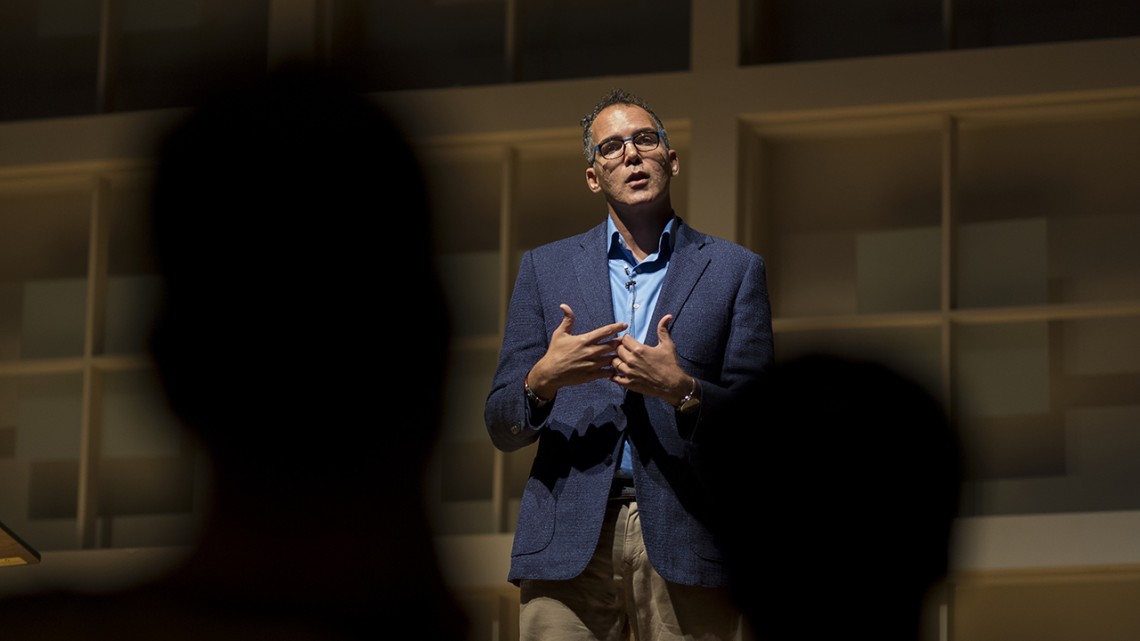
Legal scholar James Forman Jr. describes the causes of mass incarceration Oct. 4 at Alice Statler Auditorium.
Pulitzer Prize winner describes why we ‘lock up our own’ – and how to stop
By Susan Kelley
When Pulitzer Prize-winning author James Forman Jr. was a public defender in Washington, D.C., in the 1990s, he defended a 15-year-old named Brandon, who was charged with possessing a small amount of marijuana and a gun.
Through the story of that boy, Forman, who clerked for Supreme Court Justice Sandra Day O’Connor, outlined the key points of his award-winning book, “Locking Up Our Own: Crime and Punishment in Black America,” in a talk that analyzed the tenacious roots of mass incarceration and how society can stop their spread.
The Oct. 4 event at Alice Statler Auditorium was the capstone lecture for the Institute for the Social Sciences’ 2015-18 Mass Incarceration theme project and kicked off a legacy of the project: an annual lecture on the causes and consequences of mass incarceration, co-sponsored by Cornell’s Center for the Study of Inequality.
A sobering statistic foregrounded his talk: One in three young black men in America is now emmeshed in the criminal justice system.
Defending Brandon and other young black men was the “civil rights work of my generation,” said Forman, who identifies as biracial and whose parents helped lead the Student Nonviolent Coordinating Committee in the 1960s.
Brandon, who is African-American, was given a harsh sentence – even though he lived in a city where the majority of the police force and city council, the district attorney and even the judge who sentenced him were all African-American.
“What happened in this country over the last 50 years that was so powerful … that even in this majority-black jurisdiction with some measure of control over its local politics and its local criminal law … we were doing the same thing as the rest of the country?” asked Forman.
What happened was this, Forman said: Skyrocketing crime and violence in the 1980s and 1990s, related to heroin and crack cocaine, prompted D.C. residents to complain to local officials. Many of those officials were among the first generation of African-Americans to be elected in significant numbers since Reconstruction, thanks to the civil rights movement.
They operated under significant constraints, Forman said, starting with hundreds of years of racist federal policies in areas such as education, voting rights and highway placement. For decades, local officials requested federal funding for job training, gun control and mental health programs.
What did they get? Funding only for police and prosecutors, on which they became overly reliant, he said.
Local officials were also constrained by a lack of imagination, he said. When, for example, a citizen complained about a heroin addict shooting up in a park, too frequently government officials turned to the criminal legal system rather than to alternatives like mental health treatment and drug rehabilitation.
“Those tiny decisions are the individual bricks that collectively and over time have built the prison nation that America has now,” Forman said.
What can society do?
He encouraged the audience to take action. Accept jury duty, for example – and question the system when doing so. And vote in elections for local prosecutors, who are the most powerful players in the criminal justice system.
“[Most] people … who are under the supervision of the criminal justice system are there because of a decision by a locally elected prosecutor at the county level,” Forman said. In Texas and Philadelphia, reform-minded prosecutors are asking for lighter sentences and reducing incarceration, he noted. “There’s a movement afoot and it’s supported by people like you,” he said.
He also urged people to volunteer at programs such as the Cornell Prison Education Program.
And, he said, persevere. He noted both Martin Luther King Jr. and the March on Washington were unpopular in the 1960s.
“If you ignore the people who tell you that change is impossible and you pursue that idea [collaboratively] and fearlessly,” he said, “you are going to take down mass incarceration … . And when you do … I will be there with your professors … in the front row, with popcorn in hand, cheering.”
Media Contact
Get Cornell news delivered right to your inbox.
Subscribe
